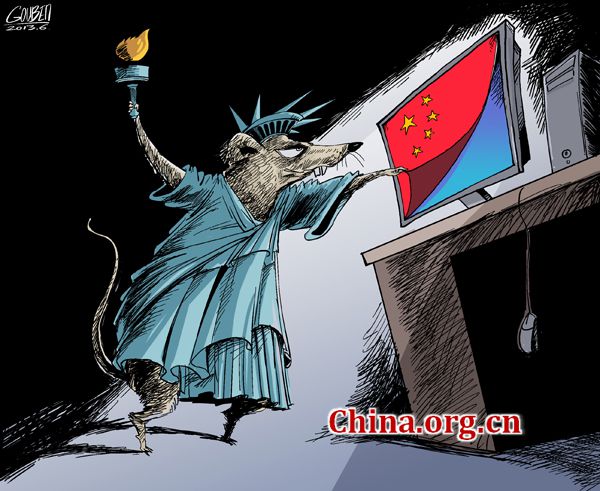Beware of strategic risks in China-US cyber contention
- By Zhang Jingwei
 0 Comment(s)
0 Comment(s) Print
Print E-mail China.org.cn, August 11, 2015
E-mail China.org.cn, August 11, 2015
|
|
|
[By Gou Ben/China.org.cn] |
Therefore, Washington's threat to attack China's firewall may just be venting anger, or a measure to seek the upper hand in the continuous bilateral struggle. Even so, while the United States was accusing China of launching the past cyber attacks, China could also list much evidence to show that many hacking activities and viruses were from the United States. Furthermore, the United States already suffers from a bad reputation for wiretapping its own allies.
The U.S. paranoia is not without reason. The United States possesses the world's most cutting-edge hardware and software technology, hosts most international servers, and has absolute control over information technology, so naturally it does not wish to share its advantages with others. This may also be a reason why the United States keeps complaining about the cyber attacks from China.
But as the world evolves, the U.S. shares in global strategies, technological revolution and even the structure of global governance are diminishing, whereas the fast-rising China is becoming the largest challenger of the United States.
The two countries' differences do not only lie in ideology, but also in ideas about national security. As a country with a mature market economy, the United States fears that Chinese hackers will jeopardize its national organs, as well as stealing its business secrets. By contrast, China stresses a different idea of national security in that enterprises should be more responsible for their own corporate security. But the United States interprets this as Beijing's total control of China's Internet and deemed that Beijing was behind the cyber attacks that Washington suffered.
Cyber wars are only small, insignificant conflicts in the endless contentions between the United States and China in the Asia Pacific region, and they are unlikely to cause major troubles so long as the two countries can handle the strategic risks well.
The author is a research fellow at the Charhar Institute.
The article was translated by Chen Boyuan. Its original version was published in Chinese.
Opinion articles reflect the views of their authors only, and not necessarily those of China.org.cn.




Go to Forum >>0 Comment(s)